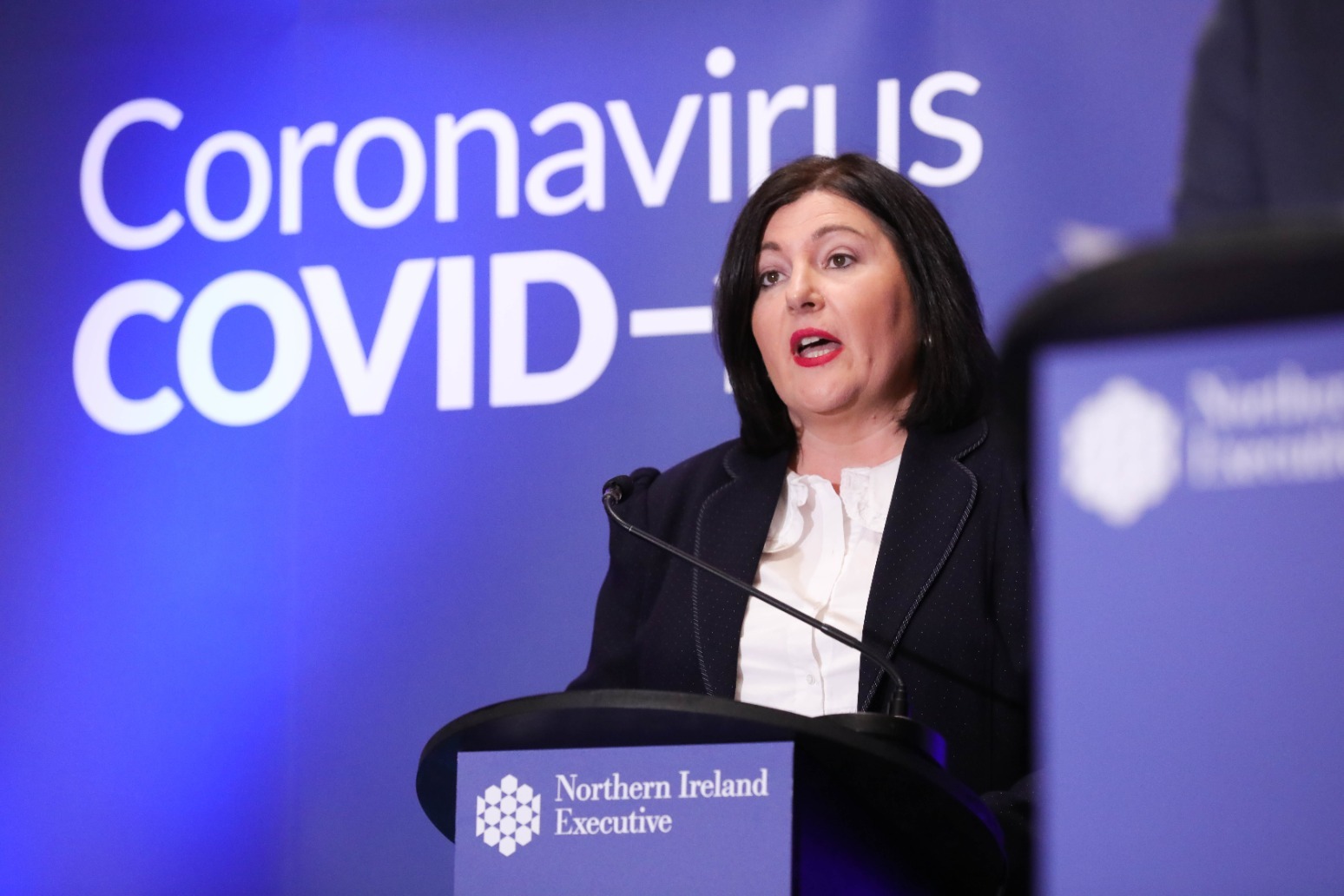
Decisions to restrict hospital visits during the pandemic in Northern Ireland were taken as “the least worst option”, the former chief nursing officer (CNO) for the region has said.
Professor Charlotte McArdle also said vacancy levels in nursing immediately before the pandemic were at their highest levels in recent years.
She told the UK Covid-19 Inquiry on Wednesday that Northern Ireland “led the way” in ensuring visitor restrictions were carried out in a person-centred way.
Prof McArdle, who had the responsibility of leading the development of visitor guidance throughout the early stages of the pandemic, said no NI-specific visitation policy for pandemics was in place at the time.
She said an existing manual on infection protection and control dealt with “normal outbreaks”.
The former CNO said visitor restrictions are a normal process in infection prevention and control.
At times, exceptions were put in place for women in active labour, palliative care patients, children and people with additional needs.
Responding to questioning from counsel to the inquiry Nick Scott, Prof McArdle said the “ground was shifting on a very frequent basis” and restrictions were changed in response to surges in infections as well as evidence on virus control measures.
Prof McArdle, who left the position in October 2021, said the primary functions of the CNO in Northern Ireland are to advise ministers and senior civil servants on matters that affect nursing and midwifery as well as to lead areas of policy development.
She said the operational responsibility for the delivery for care sits with the five integrated health and social care trusts across Northern Ireland.
Prof McArdle, currently deputy chief nursing officer at NHS England, said she regularly met directors of nursing – sometimes several times a day – on any issues with the restrictions and any possible changes that could be implemented.
She said they were “very conscious of the impact on families”.
On April 9, 2020, a decision was made to end intensive care and general hospital visiting across Northern Ireland.
Prof McArdle said: “I deeply regret that we had to make that decision but we were in the peak of the first wave.
“We were expanding our capacity for ICU, we had additional intensive care beds in most intensive care units – some of which had limited space and you will appreciate that an intensive care bed comes with a lot of kit and a lot of staffing requirements.”
She said it was not possible at the time to enable staff to allow additional people into ICUs: “It would be extra people in an already very confined space where our staff were extremely stretched at that point”.
Asked by Mr Scott if the strictness of the measure was associated with the belief the surge would last only a couple of weeks, she said: “We were between a rock and a hard place, there was nowhere else to go with this.
“It wasn’t a decision that I wanted to make or have any family experience – but it was a balance of risk between protecting patients, staff and the public.”
Prof McArdle, who said she had her own personal experience of not being able to visit her mother when she died in hospital, explained that the restrictions were reviewed in mid-April because of the toll it was taking on families.
She added that, where possible, hospital staff could have facilitated visits for end-of-life patients “even in the extremest parts of the wave”.
The former CNO said visiting was an issue at “forefront of everyone’s mind” and the health officials wanted to “be as flexible as we could and extend the opportunities for people to visit”.
Asked if there was anything more she could have done, she replied: “I think that we did our best in the circumstances. We tried to be flexible in the guidance as new evidence became available, as we became aware of particular difficulties.
“I’m not sure I could have personally done more, or my team. It was a very difficult time and decisions were the least worst option.”
Peter Wilcock, a representative for Covid Bereaved Families, asked if there had been a view among some members of the public about an inconsistent implementation of visitor guidelines at some hospitals.
Prof McArdle agreed that it had been “confusing, distressing and frustrating” at times for families, but added that it had been a “complex area” subject to local transmission rates of the virus.
Elsewhere, she told the inquiry that she had a “strong connection” with nurses on the front line throughout the pandemic and said they had plenty of opportunities to raise their concerns.
She said that the non-availability of the nursing workforce was around 20-25% in the first wave of the pandemic.
Prof McArdle said the vacancy rate for registered nursing and midwifery was 11% at the end of December 2019, right before the pandemic.
She said this was “the highest vacancy rate” during pre-pandemic years and stemmed back to workforce planning around undergraduate commissions between 2009-2012.
Prof McArdle said: “That would be a significant level of vacancy. Ideal terms, in my view, you would like a vacancy rate of around 4% which allows for natural turnover of retirements, moving etc.
“It was significantly higher. That – coupled with the impact of sickness and self-isolation – really meant, in reality, the non-availability of the nursing workforce would have been closer to 20-25%. So that was very stretching.”
She added that those effective vacancy rates were higher during other peaks in the pandemic.
Mr Scott asked if there would have been nurses to staff an desired doubling of critical care beds during the pandemic. Prof McArdle said: “It would have been extremely challenging, it would have meant reducing the ratios significantly and further action to reduce other services.”
She said that Northern Ireland had requested additional nursing staff from England, Scotland, Wales and the Republic of Ireland during a surge in October 2020, but no other nation was able to provide any.
Asked if she felt the stretched numbers impacted on patient care, she said: “I don’t think we have the evidence to say it impacted on someone’s outcome but it certainly impacted on the experience of both staff and patients.”
Published: by Radio NewsHub

